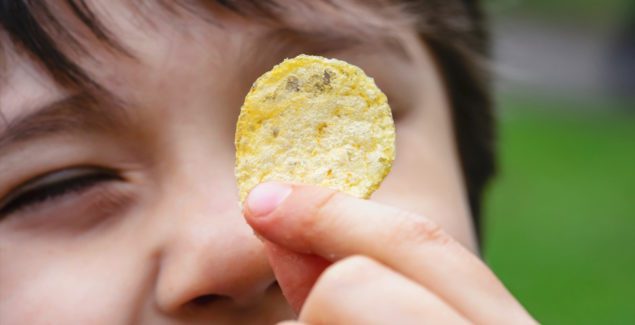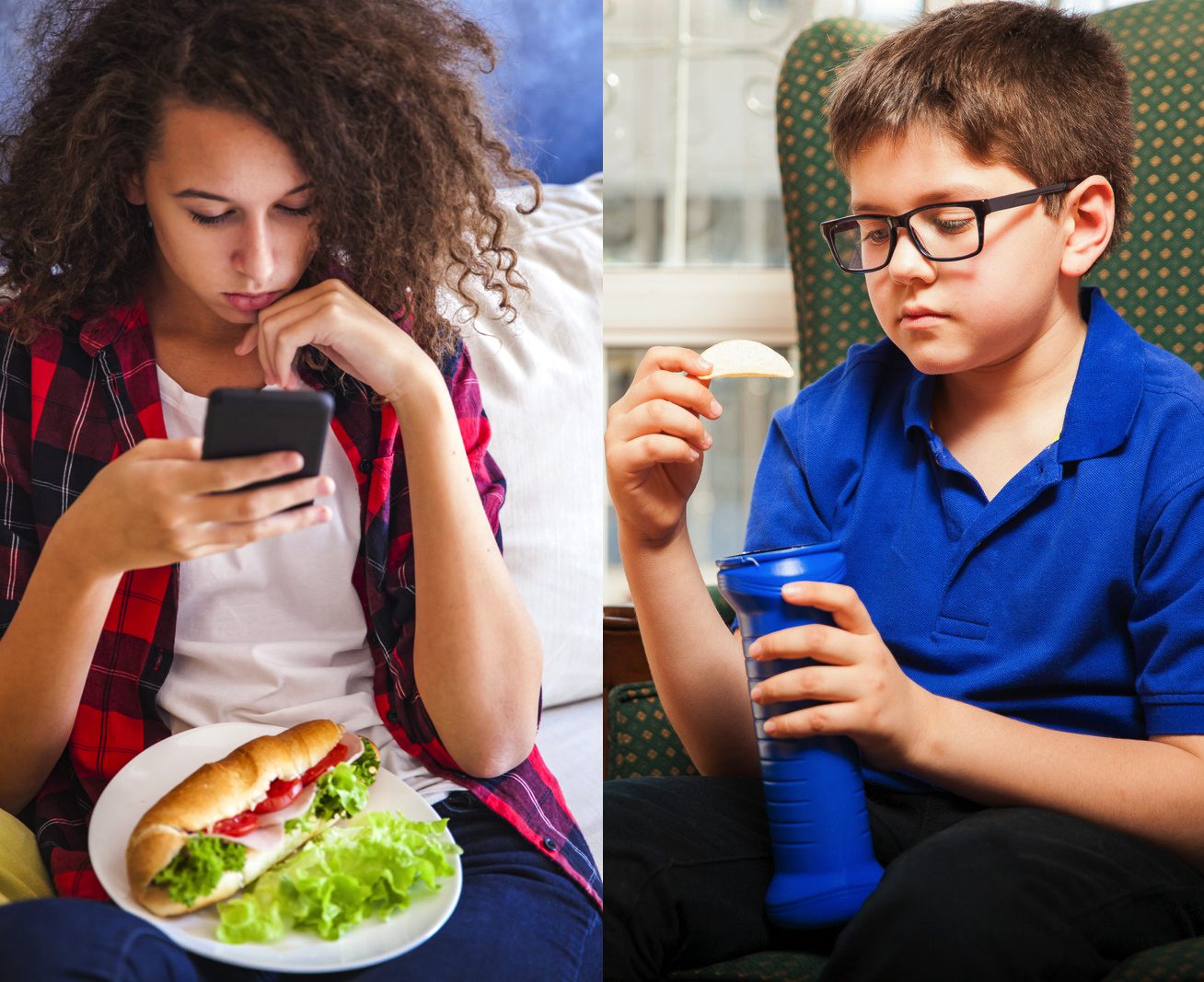Relationship Woes: Helping Your Child Break Up With Junk Food Without Harming Their Mental Health

Posted in: Grade School, Parenting Concerns, Teenagers, Young Adults
Topics: Healthy Living, Relationships
Este artículo está disponible en español.
I’ve had many relationships throughout my life. I’ve developed close ties with family members, friends and coworkers, each relationship uniquely complex. Not all of my relationships have been healthy; one of them was downright toxic! Emotionally and mentally draining, spiritually destructive, a relationship that began at age 10 when I heard my aunt say to my mom: “Yvonne is getting really fat.” No surprise, I developed a toxic relationship with food, and it would take a lot of honesty and courage to eventually form a healthy bond with the things I chewed and swallowed.
Helping a child form a healthy relationship with food is no easy feat, and the COVID-19 pandemic has made it harder. Most children and teens spent the last school year in front of a computer screen every day; many sought refuge in social media, a virtual reality in which self-esteem and confidence may be negatively impacted. The mental health challenges born from isolation, stress, and lack of social engagement triggered emotional eating and thus weight gain, putting many at risk of diseases like obesity, diabetes and hypertension.
As a parent or caregiver, your child’s health is a priority, and any concerns about their weight gain are valid. But when it comes to helping them lose weight, you might be feeling stuck, because although you’re an expert on mending cuts and scrapes, reducing a fever or nursing a cold, tackling their weight gain may feel scary and downright awkward. After all, how do you tell them they must lose weight without hurting their feelings? Actually, you don’t.
If you were to see a car swerving all over the road until eventually coming to a stop, would you look to the car to understand why it nearly caused a few accidents, or would you focus on the driver? Logically, you’d look to the driver, because the car doesn’t drive itself. The same applies to behaviors linked to food. To help your child make meaningful changes, it’s important to determine what’s ‘driving’ the behavior in the first place. Are they eating to mollify sadness? Are they bored, stressed, anxious, or afraid? Have they indeed developed an eating disorder? Regardless of the reason, it is very important to address the root cause rather than the behavior, as this will lead to meaningful and lasting change.
Here are some ways you can help them change their relationship with food.
DO…
DEVELOP AWARENESS. More than focusing on what, when, where, and how much your child is eating, first explore your own relationship with food and with your body, because whether a child is 8 or 13 years old, they hear and notice everything we do and say, and they take cues from us on what is normal. Is food your go-to when you’re feeling sad, bored, angry, frustrated, tired, or worried? Do you reward yourself with food? Do you make comments about food or your body on a regular basis? Do you focus on body image as a criteria of beauty, success, and control? This pizza probably has ten thousand calories. I was good today, so I can have ice cream. I hate my body. I need to lose weight. If you are struggling with any of this, consider that your child may be as well. Becoming more mindful of your thoughts and comments can inform whatever changes are necessary for you to become more healthy minded.
HAVE COURAGE. COVID-19 has triggered stress, anxiety, and whole host of unpleasant emotions, and because no parent enjoys seeing their child in distress, some of us have compensated for their discomfort with food because who are we kidding? Pizza is downright magical. But magic aside, when a child learns to find comfort in food whenever they’re sad or upset, or they turn to food when their world seems upside down, this emotional bond can be tough to break. Tough, but not impossible. It just takes time, patience, and courage. Not the courage to restrict their eating or to force them to exercise, but the courage to stop yourself whenever you’re tempted to appease their distress with food.
VALIDATE, don’t compensate. As a society, we’re not often taught to let our emotions run their course; from adults we learn to suppress them, to cope with them, to ignore them, or worse, to be afraid of them. Rarely are we taught to embrace every ounce of sadness. So, it might be tough for you to let your child’s emotions run their course instead of give them a fun snack, but if you want them to grow up and live their life rather than cope with it, create a safe space for them to open up to you.
Open-ended questions are an excellent way to start conversations with your child – questions that begin with who, what, when, where, and how. How do you feel about in person classes? What has been a little hard? When you feel upset, what makes you feel better? This last question helps open the conversation about healthy and unhealthy ways to deal with emotional distress, while giving you an opportunity to validate their concerns. I can sense that you’re frustrated. I’m hearing that you’re sad. I can understand why you feel that way. If your child is under the age of 10, they may not have the vocabulary to define how they’re feeling. Using emojis is a fun way for them to identify their emotions, and this too might work with kids who are in the leave-me-alone-for-the-rest-of-my-life phase of adolescence.
Kids of all ages benefit from a judgement-free zone in which to identify and explore their feelings, and this in turn can help liberate them from an unhealthy relationship with junk food. As it may not be possible for you to be present when they need to talk, encourage them to use a journal or an app that tracks moods, or to use other creative outlets like art or music.
DON’T…
…Draw attention to their weight gain or eating habits. Nothing is worse to a child or a teen than negative attention, especially in front of other family members or friends. Making comments about their weight or eating habits, regardless of how noble your intention, will inevitably damage their self-esteem and confidence, which only puts them at greater risk of developing an eating disorder. We all want our kids (and we as adults) to be aware of the health of our bodies and make eating a healthy and enjoyable activity, but highlighting their weight gain or their eating habits can very easily get interpreted as “I am not good enough” or “I am a failure” statements that can later become a breeding ground for obsessions, guilt, shame, and self-harming behaviors.
…Restrict foods. Were you ever told you couldn’t date someone, or go somewhere, or do something? It probably made you want to do it even more. It’s no different with food. Tell your child they can’t have sugar, and they will crave sugar even more so. Restricting foods doesn’t work, because it will make it hard for them to recognize when they’re experiencing real hunger. Instead, focus your energy on providing alternative foods that are healthy, and allow your child to be part of this process. Bring them to the grocery store, and let them help you choose different fruits and vegetables; they will feel like empowered participants in a new, healthy relationship with food.
…Force them to do rigorous exercise. Not every person was born to do CrossFit. There are many ways to get your child moving without having to use the words ‘calories’ or ‘exercise,’ so let them tell you what movement they enjoy and, if possible, join them. Dance with them in the middle of the day or go for a bike ride. Go for a walk as a family.
…Isolate your child. Your child’s success as it relates to developing a healthy relationship with food should not be an isolated phenomenon. Creating special rules around food and eating just for them will negatively impact their self-perception and may instill in them the idea that they’re doing something wrong. The best way to assure your child’s success is to make sure your entire family embraces the idea of healthy living. Encourage each family member to make healthy choices and be open to having conversations as a family about what it means to make health a priority above all.
…Ignore something serious. If you’re worried that your child indeed has developed a serious eating disorder, and your attempts at supporting them have not been fruitful, please talk to your pediatrician about connecting your child to a nutritionist and/or a mental health clinician. Both individual and family therapy is highly useful for the treatment of eating disorders.
Lastly… DON’T give up! Being a parent is hard work, a seemingly never-ending cycle of responsibilities, worries and stressors, and tackling your child’s weight gain and eating habits might feel like an impossible mission. But as parents and guardians, you can absolutely have a positive impact on your child’s eating habits without damaging their mental health. It may take time and you may encounter challenges, but it’s worth it, because a healthy child becomes a healthy adult becomes a healthy parent and a healthy, awesome human.


 Share
Share Tweet
Tweet





